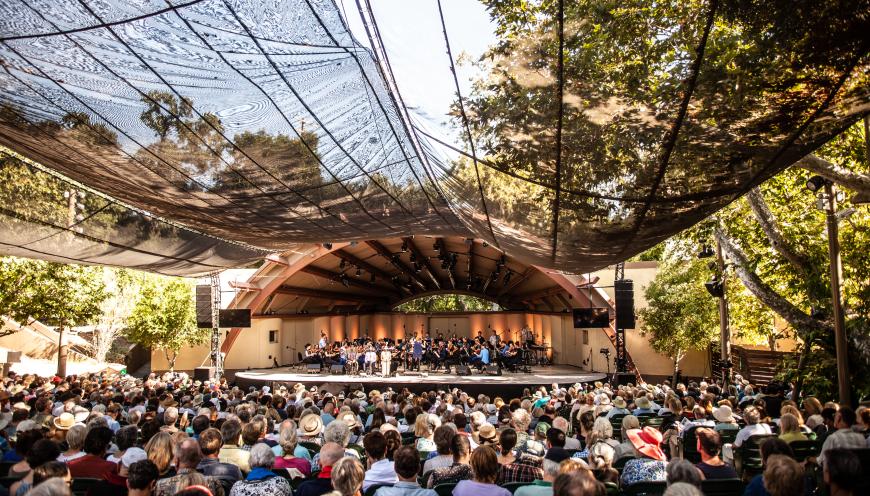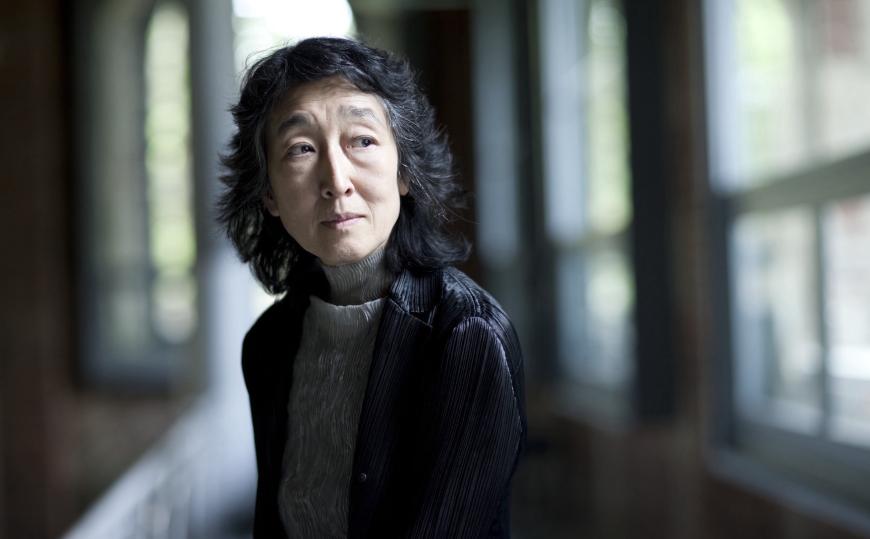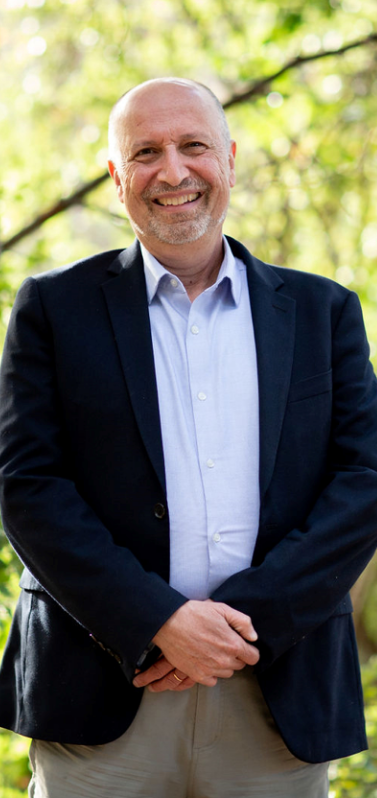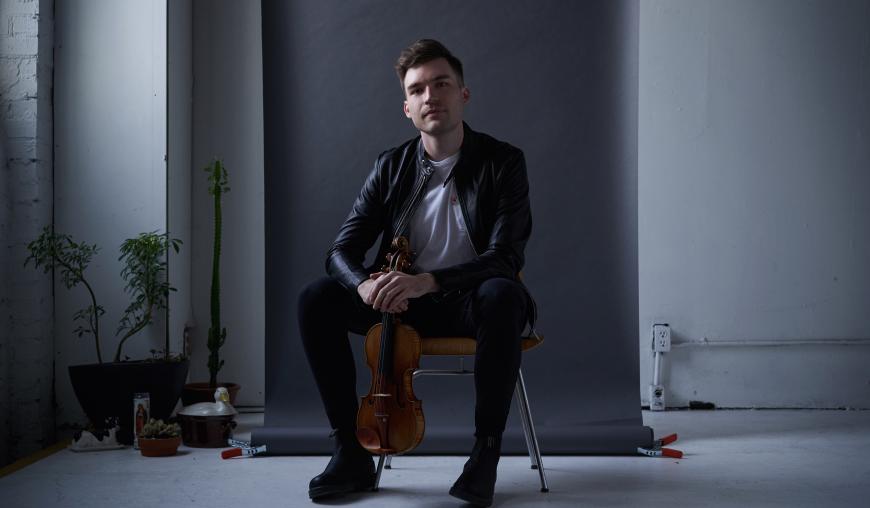
What do you consider the perfect music for early Sunday morning? A little J.S. Bach, perhaps? Some gentle jazz?
What about 45 minutes of music by John Cage for solo accordion?
That peculiar program is one of the offbeat offerings at this year’s Ojai Music Festival, which takes place June 6–9. The annual event, which has been attracting world-class musicians and adventurous audiences to the secluded Ventura County mountain community since the late 1940s, is all about discovering new music and rediscovering old favorites as they’re put into fresh, surprising contexts.
“Only in Ojai,” Ara Guzelimian, the festival’s artistic and executive director, said of the Sunday morning Cage program, which is free to the public. “The three pieces [that accordionist Ljubinka Kulisic] is playing have a beautiful, inward tone. Whatever expectations anyone has of Cage, they will be surprised.”

Also a bit surprising, at least for casual classical music fans, is the name of this year’s music director: Mitsuko Uchida. The revered pianist, Musical America’s 2022 Artist of the Year, is best known as a sublime interpreter of Mozart, and she’ll be playing three of the composer’s concertos over the course of the weekend.
But apropos for the new-music-oriented festival, Uchida has also programmed several major compositions by Arnold Schoenberg to mark his 150th anniversary year, as well as numerous works by prominent 21st-century composers including Kaija Saariaho, György Kurtág, Missy Mazzoli, and John Adams.
“I wanted to represent the lesser-known dimensions of Mitsuko’s work,” Guzelimian said in an interview. “She certainly is admired for playing Mozart, but unusually among modern pianists, she has also played Schoenberg, [Alban] Berg, and [Anton] Webern throughout her career.
“She’s playing Schoenberg’s Six Little Piano Pieces, Op. 19. The Brentano Quartet is doing his Second String Quartet, and the Mahler Chamber Orchestra is playing his first Chamber Symphony. All are pivotal pieces in the evolution of music in the 20th century.”

What’s the thinking behind programming Mozart, as well as Haydn, alongside Schoenberg?
“I think one of Ojai’s strengths is the ability to put works up against each other that speak to each other in unexpected ways,” Guzelimian said. “I hope that familiar music gains freshness from the juxtaposition and listeners pick up on unexpected links between works. Unexpected conversations that happen among pieces is part of the lovely programmatic freedom we enjoy in Ojai.”
As an example, Guzelimian points to the 10 a.m. Sunday concert, which follows the Cage wake-up call. All the music on the later morning program, Guzelimian notes, has “a spiritual quality,” but the composers’ means of expressing that idea vary enormously.
“It begins with [violinist] Alexi Kenney playing Heinrich Biber’s Passacaglia, the last of his set of Rosary Sonatas. That’s juxtaposed with Kaija Saariaho’s Six Japanese Gardens for percussion and tape, which is inspired by six specific gardens in Kyoto. Part of the electronics score is monks chanting in a temple in Kyoto.
“The program concludes with Sofia Gubaidulina’s In croce, which literally means ‘[on] the cross.’ It’s a meditation on the crucifixion, and [the music] is designed to form a cross. The cello and the accordion begin the piece at opposite extremes, with one at the lowest end of its register and the other at the highest. They then go in opposite directions, literally crossing in the middle of the piece.
“[In between those modern pieces are] three movements from Haydn’s The Seven Last Words of Christ — a work that directly inspired Jörg Widmann’s Chorale Quartet on the Sunday evening program. My hope is the pieces talk to each other not only within the programs but across the programs as well.”
Gubaidulina and Saariaho are both well represented in this year’s festival. In croce will actually be heard twice, once indoors on Friday morning and then outdoors two days later. “Given Ojai’s new-music history, we have given Mitsuko free rein to champion the composers she admires,” Guzelimian said.
Uchida has a long history with Ojai. She first appeared at the festival in 1996, when Pierre Boulez was music director. She returned as co-music director with David Zinman in 1998. In recent decades, her summer schedule has focused on the Marlboro Music Festival in Vermont; she was artistic director there from 2013–2018 and now serves as co-artistic director with fellow pianist Jonathan Biss. “Many of the artists who are participating this year [at Ojai], including every member of the Brentano Quartet, have been Marlboro musicians,” Guzelimian noted.

Another of the festival’s East Coast connections is with New York-based Baryshnikov Arts. Ojai and Baryshnikov have collaboratively produced a program called “Shifting Ground,” which violinist Kenney will perform Friday and Saturday afternoons.
“What makes it so perfect for Ojai is the way Alexi juxtaposes very old and very new music for solo violin,” Guzelimian said. “It’s a seamless arc of 45 or 50 minutes of music. With Baryshnikov Arts, we’ve developed a realization of his program with a video environment created by a Chinese American video artist named Xuan.
“She is a graduate of the Eastman School of Music, so, as Alexi says, she is a video artist with ears. Her work is almost abstract — and slowly shifting. She is responding in an intuitive, very knowing way to the music.”
It’s a fair bet that patrons will be split in their reactions to the piece. That’s the Ojai way. “Each year generates strong opinions, pro and con,” Guzelimian noted. “I delight in that. I hope what Ojai represents is a broadening of expectations. I hope it always remains surprising.
“We send out a post-festival survey to all email addresses associated with ticket buyers — about 800 discrete addresses. We have on the order of a 50 percent response. That’s unheard of! I think that represents the passion of the audience and the connection people feel with Ojai.”




